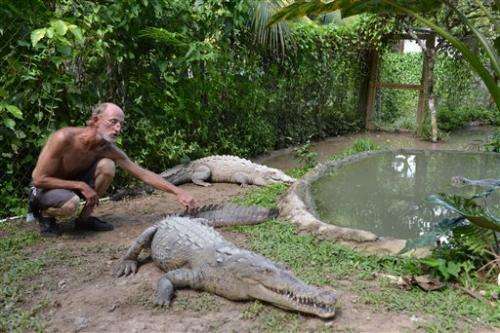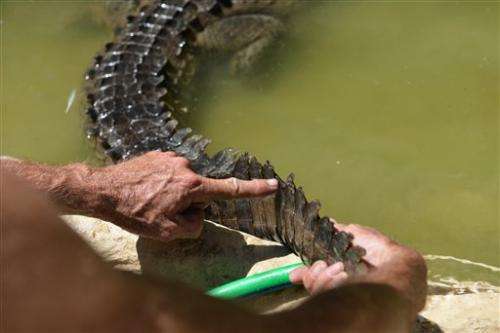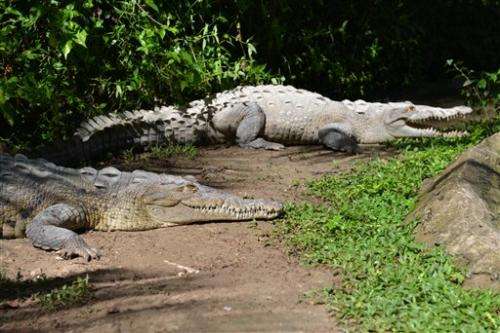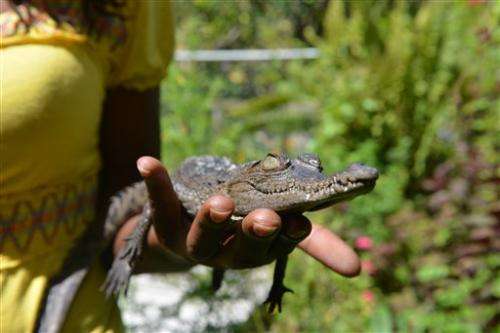Crocodiles disappearing as dinner in Jamaica

Crocodiles were once so abundant along the salty rim of southern Jamaica that images of their toothy jaws and spiny armor crown the tropical island's coat of arms and are stenciled on the bumpers of military vehicles.
Now, the big reptiles are increasingly difficult to spot, and not just because they blend into swampy backgrounds. These days, a growing taste for crocodile meat and even eggs in Jamaica has conservationists worried that the reptiles might be wiped from the wild altogether, although they've been protected by law since 1971.
"I went from never hearing about anyone eating crocodile meat, much less crocodile eggs, to hearing about it all the time. There's just so much carnage going on," said Byron Wilson, a reptile specialist at Jamaica's University of the West Indies.
Crocs have steadily reclaimed their range in Florida, their only U.S. habitat, after rebounding from the edge of extinction. But experts believe the reptiles may be reaching a tipping point in economically struggling Jamaica. A recent newsletter from the Crocodile Specialist Group, a global network involved in croc conservation, said the situation appears dire on the island as the impact of habitat loss deepens with a "new demand for crocodile meat, both for personal consumption and for local market distribution."
The poaching problem has gotten so bad in Jamaica that a passionate reptile enthusiast, Lawrence Henriques, has set up a crocodile sanctuary and captive rearing program just outside a tiny northern mountain town called Cascade, far from the animals' southern habitat, as insurance against future loss. He also hopes to educate islanders who revile them or want to barbecue them.
His facility's fenced pens and ponds now hold about 45 gray-green crocs, including a nearly 11-footer (3.3 meters) nicknamed "Stumpy" because of a severed tail. Nearby, opening its big jaws to display sharp interlocking teeth, a nearly 8-foot (2.4 meter) female dubbed "Doris" basks in her new home. Last month, Henriques rescued her in southern St. Thomas parish after her mate was fatally shot in the head.
"It's very worrying that so many people just have no regard for the laws protecting these animals," said the wiry and tenacious Jamaican, speaking over a forest symphony of insects in his croc retreat, which has a sign warning the rare visitor that they enter at their own risk.

According to Henriques, some poachers use baited shark hooks to bag crocs, mostly sub-adults measuring about 7 feet (2 meters) long. People in St. Thomas also reportedly dig up eggs after nesting females deposit them on beaches.
Croc meat appears to be a specialty high-end business in Jamaica, with wealthy private buyers willing to pay as much as $35 per pound (about a half kilogram). Some of the meat stays in rural towns along the reptiles' brackish habitat, with secret crocodile-eating parties drawing men who insist it enhances sexual virility.
"It's totally underground and people keep it very hush-hush," said Sharlene Rowe, a conservation officer with the Caribbean Coastal Area Management Foundation who has seen two carcasses with tails chopped off floating down the Salt River in southern Clarendon parish.
The animals mostly live among tangled mangrove roots in places such as the Black River, which snakes through a marshland known as the Great Morass. Tour boat operators regularly take tourists along the river to gape at crocs accustomed to circling the boats, lured by the promise of chicken meat.
Compared to its fearsome cousins in Africa and Australia, the "American crocodile" species found in Jamaica is mostly reclusive, shying away from humans as best they can. But mature adults are very big reptiles and during breeding season they can be aggressive if they feel threatened. Three Jamaicans have been killed by crocs since the 1980s.

Reptile experts say it's far from clear why poaching is now on the rise. Some suggest the demand has grown due to a rising population of Chinese immigrants, who reportedly eat the reptiles. Others say cable TV food shows may be boosting a local demand for exotic meat.
Nobody is getting punished for hunting crocodiles, which is adding to the activity's spread. Even in the best of times, wildlife enforcement in Jamaica ranges from lax to nonexistent, and state agencies are dogged by a lack of financing, with scarce resources to do the investigations needed to catch crocodile poachers.
Andrea Donaldson, a manager at Jamaica's National Environment & Planning Agency, said attempts to catch poachers in sting operations haven't yet worked out.

"It's been extremely difficult. We typically go and investigate areas where are reports that they're eating crocodile and we remind them that it is illegal," said Donaldson, adding that authorities are confident that none of the meat is being exported out of the country.
A recent operation had unprecedented success when suspicious meat was seized at a Kingston restaurant, but authorities are still trying to determine whether it's crocodile or imported alligator. Animal advocates are hopeful that a prosecution in this case will set an example to people who deal in the illegal wildlife trade.
While the government completes a crocodile management plan, many residents in Jamaica still dread the reptiles, and saving them is a mostly a mission of mercy for a handful of enthusiasts. Henriques, for one, said the government should set aside wildlife preserves to protect the iconic creatures, speaking as he sprayed water on several juvenile crocodiles rescued from threatening situations.
"As it is now," he said, "the resources to protect crocs are so small compared to the problems that we face that it will be a never-ending fight."
© 2013 The Associated Press. All rights reserved.




















